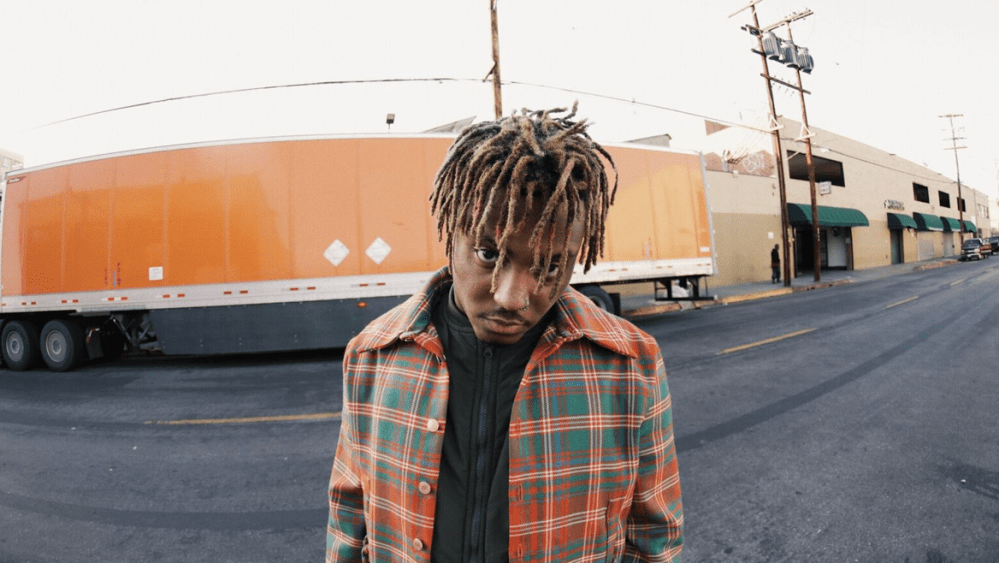For obvious reasons, posthumous albums are always a challenge to create. And from Jimi Hendrix to Nat King Cole to Tupac, some have been successful commercially and creatively — others, not so much.
But when Lil Bibby tweeted, “The Party Never Ends,” in May 2021, he didn’t think the project he was teasing — the third and final posthumous album from genre-bending rapper Juice WRLD — would take three years to assemble. “I just wanted it to be perfect,” says Brandon Dickinson, aka Lil Bibby, who formed the label Grade A Productions with his brother George “G-Money” Dickinson in 2017 after hearing Juice’s breakthrough hit “Lucid Dreams” on SoundCloud. “This last one, I just wanted it to be as good as the first ones.”
“The Party Never Ends,” releasing on Nov. 29 after a string of delays, is the coda on a career cut short after Juice WRLD died of an accidental overdose in 2019 at 21. In his fleeting time as a recording artist — his death came a year and a half after “Lucid Dreams” became a definitive cornerstone of SoundCloud rap — he built the type of cachet that artists spend years pursuing, amassing a fan base captivated by his singsong flow and raw meditations on mortality and drug addiction. All four of his albums, including the two released after his death, debuted in the top five of the Billboard 200. Even now he has more than 30 million monthly Spotify listeners.
Juice was a prolific rapper — he famously freestyled for an hour on Tim Westwood TV in 2018 — and left behind a catalog maintained both in-house and by producers who collaborated with him. In the years following Juice’s death, Bibby has worked alongside G-Money and Grade A COO and Juice manager Peter Jideonwo to sift through the roughly 1,000 unreleased songs the label holds.
As Juice’s legacy grew, so did the interest in the vault of music collecting dust. Leaks sprang up on the internet and the community-driven app Discord, where sellers would often put tracks (or “grails,” as they’re named) up for auction, with bids sometimes reaching $50,000 for a single song. The more his songs leaked, the more complicated the album became.
“The stock of his music became exceedingly high,” says Jideonwo, who estimates that 800 songs outside the thousand Grade A possesses have been leaked. Bibby approximates it at over 1,000. “The real problem became the integrity of the producers and the studios and friends and people that had access to [the music].” That, plus the hackers who were mining tracks from them. “It became very distasteful.”
The leaks have been a double-edged sword. Though they’ve slowed the process of crafting “The Party Never Ends,” the songs have also kept fans engaged. “It’s sort of helped put him on some people’s lists at number one, and there was not a close second,” says Jideonwo. “That would be the takeaway, it just kept his name alive, because every two months, 20 songs would leak. It was almost like the man was putting out an album every month.”
Beyond that, assembling posthumous releases can be particularly tricky because the fans demand music yet often aren’t satisfied with what’s delivered. The “Party Never Ends” project has been “tough,” says Bibby. “Some of the fans don’t recognize that it’s the music business,” he says. In other words, the album came with its own set of hurdles, from clearing samples to obtaining approvals from the musicians who worked on the songs to getting Juice’s mother to sign off on the record.
Combating misinformation became background noise around the production: There were rumors that it was delayed because Bibby’s X account got hacked and whispers that it went through seven iterations under Juice’s engineer Max Lord before being handed over to producer Benny Blanco, who declined to speak for this story. (“That’s made-up stuff,” Bibby says.)
After all the obstacles, the completed album is largely true to Juice’s original recordings. Roughly half the tracks are unreleased; the others were leaked in some form. Only one song has altered production, and there are some freshly recorded verses from Juice associates. Opener “Misfit” recalls “Lucid Dreams,” complete with spidery guitars. Upbeat numbers “Celebrate,” featuring Offset, and lead single “All Girls Are the Same 2,” with Nicki Minaj, aim to please the fans who complained that the first two posthumous releases were too introspective.
Fans may wonder why “The Party Never Ends” is, in fact, the end, when there’s a pile of unheard Juice WRLD music sitting on hard drives. Why shouldn’t Grade A just put the records out? Because “they’ll probably get leaked,” says Bibby, with a laugh. Does that mean that there’s potentially another chapter when it comes to new albums? No, he says, “it’s closed.”
That doesn’t mean that the world won’t see new Juice WRLD music. He collaborated with many artists, and recently, Marshmello previewed two collabs — “We Don’t Get Along” and “Soda Pop” — on Kai Cenat’s livestream. The former is likely to come out as a standalone, says Bibby, and Jideonwo foresees singles and guest appearances in the future.
Meanwhile, the rollout to “The Party Never Ends” will see a Fortnite partnership (where gamers can wear a customized Juice WRLD skin) and the fourth Juice WRLD Day in Chicago on Nov. 30. All of this, says Jideonwo, is testament to the imprint the generational artist left on the music world and the legacy his collaborators continue to build in his name.
“The music is just one chapter of the bigger book that needs to be written about how great he is,” he says. “With Juice, I think the next chapter is to really make him immortal.”
Read the full article here








